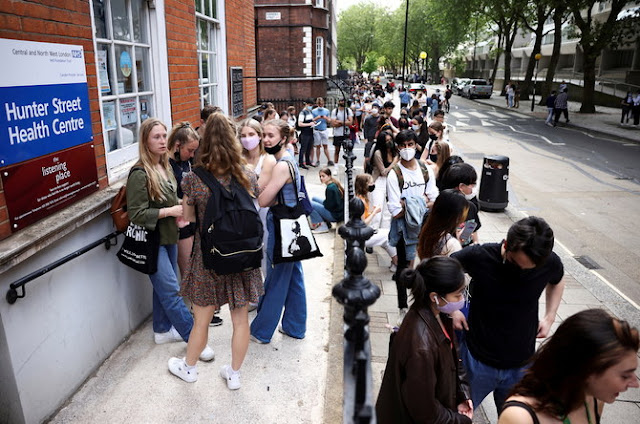Record numbers of COVID-19 cases were registered in the UK last week, two years after the country’s first lockdown began. The Office for National Statistics said this rise was due to the highly transmissible omicron BA.2 variant. Thankfully, the high number of cases has not (so far) translated into significantly increased levels of hospital admissions or deaths
.
The rise in cases comes as the UK prepares to end widespread free testing, which many experts are warning might make the disease harder to track, allowing it to spread into uncharted territories without our knowledge.
Luckily, the vaccines and boosters, improved treatment and less-than-severe nature of the omicron variant have all conspired to make the infections less life-threatening, limiting the number of those needing critical care and hospital admission.
Despite that, I am still against abandoning our vigilance. One would hope that free testing would continue as a second line of defense that is necessary beyond our continued compliance with the first basic line of defense, which is based on our common sense: Keeping our distance, maintaining our hygiene and wearing face masks in crowded places, even if this is no longer mandatory.
Governments worldwide have been keen to abandon all the restrictions that were designed to suppress the spread of infection in the hope of restarting their economies. Like the UK, many governments in Europe have, it seems, chosen to ignore the volume of infections and to focus on monitoring hospitalization levels and overall deaths due to COVID-19 as guiding factors in their decision-making.
Germany, Italy, France and Poland will lift all restrictions despite a clear upsurge in cases, with only Austria deciding to strengthen its measures as a response to the omicron BA.2 variant, requiring the use of face masks in indoor public settings. Government decision-making in most countries has been based on experts’ assessments that, despite omicron BA.2’s tremendous contagiousness, it has been running out of people to infect, at least in countries with high vaccination levels. This might expose other nations with lower vaccine uptake, such as the US, making an upsurge and possible mutation likely, with unknown repercussions.
Though the World Health Organization had originally forecast a long period of tranquility in the pandemic’s development in Europe, it now believes that the current surge in cases is due to the brutal sweeping away of all restrictions, as well as the fact that people have stopped wearing masks and have been socializing more.
Keeping in mind that not all nations have crossed the threshold of adequate vaccination to afford their citizens the needed protection, coupled with the widespread return of international travel, communities will remain vulnerable to infections, upsurges in cases and maybe mutations. Until more countries cross the threshold of two-thirds of citizens being vaccinated, we cannot be certain that COVID-19 is retreating worldwide.
The pandemic has changed our world for good, yet it seems to have taught humanity nothing. The total lifting of restrictions could be partly responsible for the surge in cases witnessed in European countries. There is a fine line between declaring victory, while congratulating ourselves for the return of our freedoms, and keeping hold of a safety net that could mitigate the impact of this dangerous disease. Without sufficient global vaccination, enough good ventilation, the wearing of masks, the availability of free testing, the ability to isolate when infected, and investment in public health and research, the world will still have to live with the disease, its disruptions and, unfortunately, the illnesses and deaths it causes.
Two years on from the start of the pandemic, the jury is still out as we grapple to understand how best to deal with this disease and any future pandemics, as many say that such outbreaks are likely to become more frequent due to the world becoming more crowded and our environment more polluted. Was herd immunity a valid route to take? Or was test and trace necessary to curb the spread of infection? What about the draconian lockdowns seen in many countries until we put all our eggs in the basket of vaccines and Big Pharma? Maybe we will not know for many years.
One thing I felt was the capital weakness that made many developed and emerging countries alike more vulnerable to COVID-19 was the weak state of nations’ health sectors, which were often starved of funds due to cuts, a lack of investment or simply corruption due to short-sighted policies.
Looking back at the past 24months of a world gripped by COVID-19, I am grateful for the arrival of the vaccines, despite all the conspiracy theories that have polluted minds and souls. The pandemic has demonstrated our vulnerability, as the world can be brought to a standstill by a mere virus. One would have hoped that it would refocus people’s hearts and minds, as well as governments everywhere, about the interdependence of our existence. Sadly, all one could see was the short fuse of impatience everywhere, as the world has failed to take a break from violent conflicts and has even started new ones.

